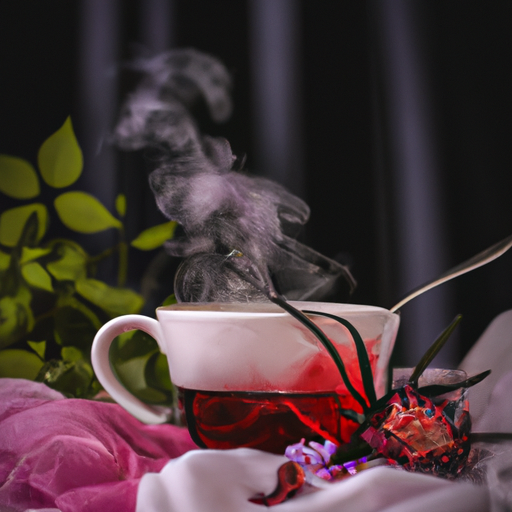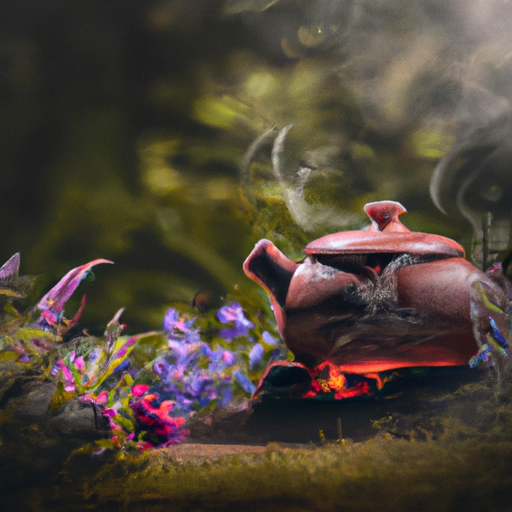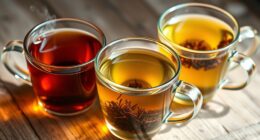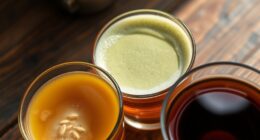Did you realize that inadequate blood circulation can result in a range of health problems, such as fatigue, cold hands and feet, and even more severe conditions like heart disease? It’s important to make our circulation a priority for our overall health.
Thankfully, nature has provided us with a range of herbal teas that can help improve blood flow and promote optimal health. In this article, I will explore the top herbal teas known for their blood flow-boosting properties. From the warming and invigorating ginger tea to the memory-enhancing Ginkgo Biloba tea, these natural remedies have been used for centuries to support healthy circulation.
We will also delve into the benefits of hawthorn tea, cayenne pepper tea, nettle tea, turmeric tea, and green tea. So, if you’re looking for a natural way to improve your blood flow, keep reading to discover the power of these herbal teas.
Key Takeaways
- Ginger tea enhances blood circulation by relaxing blood vessels and can be beneficial for conditions like Raynaud’s disease.
- Ginkgo Biloba tea improves blood flow and increases oxygen supply to the brain while reducing inflammation.
- Hawthorn tea strengthens blood vessels, regulates blood pressure, and promotes cardiovascular health by reducing inflammation and lowering LDL cholesterol and triglyceride levels.
- Green tea, rich in antioxidants and catechins, reduces inflammation, improves blood flow, and reduces the risk of heart disease.
Ginger Tea
If you want to improve your blood flow, ginger tea is the herbal remedy for you! Ginger tea is known for its numerous health benefits, including its ability to enhance blood circulation. This spicy and invigorating tea contains compounds that help relax blood vessels, allowing for smoother blood flow throughout the body.
Additionally, ginger has anti-inflammatory properties that can reduce the risk of blood clot formation, further improving circulation. To make ginger tea, simply steep fresh ginger slices or grated ginger in boiling water for 10-15 minutes. You can also add a squeeze of lemon or a teaspoon of honey for added flavor.
Now, let’s move on to the next herbal tea that can also support healthy blood flow – ginkgo biloba tea.
Ginkgo Biloba Tea
Ginkgo Biloba tea enhances the circulation of blood throughout the body. This herbal tea has been used for centuries in traditional Chinese medicine to promote cardiovascular health. The key benefits of Ginkgo Biloba include its ability to improve blood flow, increase oxygen supply to the brain, and reduce inflammation.
To experience the full benefits of Ginkgo Biloba tea, it’s important to consume it in the proper dosage. The recommended dosage ranges from 120-240 mg per day, divided into two or three doses. It’s advisable to start with a lower dosage and gradually increase it to avoid any potential side effects.
When it comes to improving blood flow and overall cardiovascular health, Ginkgo Biloba tea is a natural and effective choice. However, it’s always important to consult with a healthcare professional before incorporating any herbal teas into your daily routine.
Now, let’s move on to the next herbal tea that can further support blood flow: hawthorn tea.
Hawthorn Tea
Hawthorn tea is a fantastic herbal remedy that can strengthen blood vessels and regulate blood pressure. It’s been used for centuries to promote cardiovascular health and improve circulation. Studies have shown that hawthorn tea can effectively reduce high blood pressure and lower cholesterol levels.
Strengthens Blood Vessels
Boost your blood flow by sipping on a cup of herbal tea that acts as a mighty sculptor, strengthening your blood vessels like a skilled artisan shaping a masterpiece.
One such herbal tea that excels in this regard is hawthorn tea. It’s packed with bioactive compounds like flavonoids and oligomeric procyanidins, which have been shown to improve blood flow by strengthening blood vessels. These compounds work by dilating the blood vessels, reducing resistance to blood flow, and promoting healthy circulation.
By regularly enjoying a cup of hawthorn tea, you can enhance your cardiovascular health and support optimal blood flow throughout your body.
As we delve deeper into the benefits of hawthorn tea, we’ll discover how it not only strengthens blood vessels but also regulates blood pressure, ensuring a well-balanced circulatory system.
Regulates Blood Pressure
Improve your overall cardiovascular health by regularly incorporating herbal tea into your routine, as it effectively regulates your blood pressure and promotes a well-balanced circulatory system. Here are four ways in which herbal tea can help regulate your blood pressure and improve heart health:
-
Hawthorn tea: Studies have shown that hawthorn tea can lower both systolic and diastolic blood pressure, making it an excellent choice for those looking to regulate their blood pressure naturally.
-
Hibiscus tea: This vibrant red tea contains compounds that’ve been found to reduce blood pressure levels, making it a great addition to your daily routine.
-
Ginger tea: Ginger has long been known for its ability to improve cardiovascular health. Regular consumption of ginger tea can help lower blood pressure and improve blood flow.
-
Green tea: Rich in antioxidants, green tea has been shown to lower blood pressure and reduce the risk of heart disease.
Incorporating these herbal teas into your daily routine can have significant benefits for your cardiovascular health. Now, let’s explore the benefits of cayenne pepper tea.
Cayenne Pepper Tea
Cayenne Pepper Tea is a powerful herbal remedy that stimulates blood circulation and increases metabolism. When consumed, the active ingredient in cayenne pepper called capsaicin dilates blood vessels, allowing for improved blood flow throughout the body.
This can help to prevent blood clots and promote overall cardiovascular health. Additionally, the thermogenic properties of cayenne pepper can boost metabolism, aiding in weight management and increasing energy levels.
Stimulates Blood Circulation
Feel the gentle warmth of ginger tea as it dances through your veins, invigorating your body and awakening the flow of life within you. Ginger tea is a natural remedy that improves blood circulation, helping to combat poor blood flow. The active compounds in ginger, such as gingerol and zingerone, have been shown to have vasodilatory effects. This means they relax and widen blood vessels, allowing for better blood flow throughout the body. This can be particularly beneficial for those who experience cold hands and feet or suffer from conditions like Raynaud’s disease.
By incorporating ginger tea into your daily routine, you can support a healthy circulatory system and promote overall well-being. As blood flow increases, so does metabolism, which we’ll explore in the next section. So, let’s dive into how ginger tea can boost your metabolism and support your body’s natural processes.
Increases Metabolism
Boost your metabolism and rev up your body’s natural fat-burning processes with a cup of invigorating ginger tea. Ginger has long been known for its ability to increase energy and stimulate the metabolism. It contains compounds called gingerols that have been shown to enhance thermogenesis, the process by which the body burns calories to produce heat.
By drinking ginger tea regularly, you can give your metabolism a much-needed boost and help your body burn more calories throughout the day. Additionally, ginger tea aids digestion by promoting the production of digestive enzymes and reducing bloating and indigestion.
So, if you’re looking for a natural way to increase your metabolism and improve your digestion, ginger tea is the perfect choice. Now, let’s move on to the next herbal tea that can improve blood flow: nettle tea.
Nettle Tea
Try incorporating nettle tea into your daily routine to see if it improves your blood flow. Nettle tea has numerous health benefits, including its potential to enhance blood circulation. It contains compounds like flavonoids and vitamins that promote healthy blood vessels and improve blood flow throughout the body.
To prepare nettle tea at home, simply steep dried nettle leaves in hot water for about 5 minutes. You can also add other herbs or spices to enhance the flavor, such as lemon or honey. Drinking nettle tea regularly may help improve your overall cardiovascular health and increase blood flow.
Moving on to the next herbal tea, turmeric tea, let’s explore its potential benefits for blood circulation.
Turmeric Tea
Turmeric tea is an excellent choice for promoting healthy blood flow and cardiovascular health. This herbal tea is known for its ability to reduce inflammation in blood vessels, which can improve overall circulation. With its holistic benefits and evidence-based properties, turmeric tea is a wise addition to any wellness routine.
Reduces Inflammation in Blood Vessels
Improve your blood flow and promote healthy blood vessels by incorporating herbal teas that’ve been shown to reduce inflammation. When it comes to herbal remedies for improving blood flow, natural ways to reduce inflammation in blood vessels are essential.
One effective option is turmeric tea, which contains curcumin, a powerful anti-inflammatory compound. Drinking turmeric tea regularly can help reduce inflammation in blood vessels, allowing for improved blood flow throughout the body. To maximize the benefits, consider adding the following herbal teas to your routine:
-
Ginger tea: Ginger has anti-inflammatory properties that can help reduce inflammation in blood vessels.
-
Green tea: This tea’s rich in antioxidants, which can help reduce inflammation and improve blood flow.
-
Hawthorn tea: Hawthorn has been shown to promote cardiovascular health and reduce inflammation in blood vessels.
-
Peppermint tea: Peppermint’s got a calming effect on blood vessels, reducing inflammation and promoting healthy blood flow.
Incorporating these herbal teas into your daily routine can support cardiovascular health and promote optimal blood flow.
Supports Cardiovascular Health
Boost your heart health and keep your cardiovascular system in tip-top shape by incorporating these herbal remedies that support optimal blood circulation. One of the most effective herbal teas for improving heart health and lowering cholesterol is hawthorn tea. Hawthorn has been used for centuries to promote cardiovascular wellness and is known for its ability to strengthen the heart muscle, improve blood flow, and reduce cholesterol levels. Research has shown that hawthorn can help lower LDL cholesterol and triglyceride levels, which are both risk factors for heart disease. Additionally, hawthorn has been found to improve blood vessel function, reduce inflammation, and support overall cardiovascular health. Including hawthorn tea in your daily routine can be a delicious and natural way to support your heart health. Transitioning to our next topic, let’s explore the benefits of green tea.
Green Tea
Green tea is a fantastic option for enhancing blood flow and enjoying a refreshing cup of herbal goodness. Not only does it offer numerous health benefits, but it’s also known for its positive effects on cardiovascular health.
Green tea contains catechins, which are powerful antioxidants that can help improve blood flow and reduce the risk of heart disease. These catechins have been shown to relax blood vessels, allowing for better circulation throughout the body.
Additionally, green tea has been linked to weight loss, making it an excellent choice for those looking to improve their cardiovascular health.
So, whether you’re sipping on a warm cup in the morning or enjoying it iced on a hot summer day, green tea is a delicious and beneficial herbal option for promoting healthy blood flow.
Frequently Asked Questions
Are there any potential side effects or interactions to be aware of when consuming these herbal teas for blood flow?
Potential risks and precautions to take when consuming herbal teas for blood flow include allergic reactions, drug interactions, and possible side effects such as upset stomach or headaches. It’s important to consult a healthcare professional before starting any new herbal regimen.
How often should I drink these herbal teas to see noticeable improvements in blood flow?
Regular consumption of herbal teas can lead to noticeable improvements in blood flow within a few weeks. In addition to herbal teas, other natural remedies like exercise, garlic, ginger, and cayenne pepper can also help improve blood flow.
Can these herbal teas be consumed by individuals with certain medical conditions, such as high blood pressure or diabetes?
Individuals with high blood pressure or diabetes should be cautious when consuming herbal teas for blood flow. Potential side effects and interactions may occur. Consult with a healthcare professional for personalized advice.
Are there any specific dosage recommendations or guidelines for preparing and consuming these herbal teas for optimal blood flow benefits?
For optimal blood flow benefits, it is important to follow dosage recommendations and preparation guidelines. These guidelines ensure that herbal teas are consumed safely and effectively, promoting overall health and well-being.
Can I combine different herbal teas mentioned in the article to enhance their blood flow-boosting effects, or should I stick to consuming them individually?
Combining herbal teas for enhanced blood flow can be beneficial, as different herbs have complementary effects. However, it’s important to consider potential interactions and consult a healthcare professional. The best time to consume herbal teas for optimal blood flow benefits is throughout the day.
Conclusion
In conclusion, the herbal teas mentioned in this article offer a delightful way to promote healthy blood flow. From the invigorating warmth of ginger tea to the rejuvenating effects of ginkgo biloba tea, these natural remedies have been used for centuries to support optimal circulation.
Incorporating hawthorn tea, cayenne pepper tea, nettle tea, turmeric tea, or green tea into your daily routine may provide a gentle nudge towards improved blood flow. Embrace the power of nature and sip your way to a vibrant, well-nourished body.










